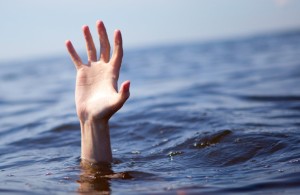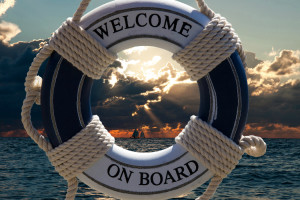The Ship in the Sea: Using our Pain to Empathize and Heal (Eshet Chayil, Part 14)
By Sara Esther Crispe: January 19, 2016: Category Decoding the Tradition, Inspirations
Hayita kaniyot socher, mi merchak tavih lachmah
“She is like a merchant ship; she brings her bread from afar.”
 There is the well-known idea that if you want something done, ask an extremely busy person to do it. Counterintuitive? Yes. True. Absolutely.
There is the well-known idea that if you want something done, ask an extremely busy person to do it. Counterintuitive? Yes. True. Absolutely.
Likewise, if you want support, empathy and understanding during a crisis, ask someone who has been through a crisis.
When we are going through a challenge we may feel that we are drowning in the middle of the ocean. We are surrounded by the waters with no dry land in sight and there is only so long that we will be able to keep our head above water. But then we see a ship. This ship is also in the middle of the ocean. It is also submerged to a great extent in the water, more than half way under, but there is a key difference between us and that ship. That ship offers a piece of dry land. That ship is both inside the sea and outside of the sea simultaneously. And the one aboard? That person knows what it is like to be in the middle of the ocean. That person is in the middle of the ocean. But as long as he or she remains on board the ship, that person can reach over, give us a hand, and pull us likewise to safety.
It is not that others don’t care. They do. They want to help. But they just can’t understand or relate to what we are going through. They are the ones on the shore, waving their arms frantically, screaming “I am here for you!” but they can’t do a thing to really help. They are nowhere near us. They mean well but ultimately only someone else in the middle of the ocean can help us board that ship.
The word in Hebrew for ship, aniyot, can form two other words from the letters that comprise it. ‘Toch ani’ which means, “from within myself.” It is the idea of empathy. Of being able to be there for another person not because you feel badly for that person’s pain but because you truly feel that person’s pain.
This is why in Israel there is a beautiful and powerful custom which drives home this idea. Generally speaking, when a person passes and the Jewish mourning period of shiva begins, the first or second day of the seven day mourning period is attended only be the immediate family and closest friends of the deceased. It is not the time for community members and acquaintances to show their support. That is more appropriate the third, fourth and following days.
Yet when there has been a terror attack in Israel–when someone was lost due to the senseless violence and hatred of being murdered simply for being a Jew–following the funeral, when the mourning period begins, those who have likewise lost loved ones to terror attend along with the immediate friends and family. Though strangers in the sense that they have never met, they share a closeness and bond unlike no other. With all of the sympathy and wishes and tears, there is simply no one that can offer the level of support, encouragement and proof that they will survive this tragedy, than one who has stood in their shoes. The mother who likewise lost her child can tell this grieving mother, “I promise you, you will survive. You will even thrive.” She is the only one who can say that. And mean it.
This fifth verse of Eshet Chayil compares the woman to the ship. The one who goes out, far away, to bring back sustenance to her family. To provide for her loved ones. She must travel. There is risk involved. Yet she does what it takes to be there for them. When we replace the idea of physical sustenance with spiritual and emotional sustenance we are reminded once again that often it is through our very challenges that we become better, more sensitive, more giving people. The idea of chayil, of valor, is defined as “strength of mind or spirit; personal bravery.” The reminder that we are all fighting battles. And those battles make us who we are. They teach us who we are capable of becoming. There is a great quote which reads “I’ve yet to meet a strong person with an easy past.”
But the verse doesn’t stop there. It continues that she goes out to the middle of the ocean, in that ship where she can save those from drowning, and it is from there that she brings back her bread.
Bread in Judaism is the foundational food. It is considered holy and separate from all other food. That is why challah is eaten on Shabbat and holidays. That is why there is the process of washing one’s hands before the eating of bread and then an extensive blessing after the meal in which bread was eaten. Bread represents sustenance. Even in modern day language we refer to “bread” and “dough” as money.
Furthermore bread should not be thrown out with the rest of the garbage. We never want to be flippant with our material sustenance and it should always be respected. Many therefore wrap their bread or throw it away separately to give it a different status. If you have been to Israel and wondered why there are pieces of bread thrown on the sidewalk, this is because another use of unwanted bread is to feed it to the birds. To recognize that there are always others that can use what we no longer need. Nothing should be wasted. Everything has value.
 This verse is reminding us that who we are, that what we are made of, is valuable. No matter what we have gone through, it cannot take away our holiness. And even the very things that we wish never happened–those experiences that caused us to feel like we were drowning in the sea–those very experiences have given us an ability to empathize and help others in a way we couldn’t have without having been there. There are times we are the ones in the ocean, struggling to keep our head above water. But even when there, we need not fear as somewhere nearby is that ship that can pull us aboard. Other times we are the ship, and we can offer that dry land to the one who feels as if he is sinking. And this is where we find and bring back that bread. The true sustenance. The true richness in our lives. For it is a great blessing when we can see the value in our pain. When we can use it to help others through theirs. When we have the ability to search within (aniyot = ship = toch ani = within myself) and take where we have been and what we have gone through to help another in need.
This verse is reminding us that who we are, that what we are made of, is valuable. No matter what we have gone through, it cannot take away our holiness. And even the very things that we wish never happened–those experiences that caused us to feel like we were drowning in the sea–those very experiences have given us an ability to empathize and help others in a way we couldn’t have without having been there. There are times we are the ones in the ocean, struggling to keep our head above water. But even when there, we need not fear as somewhere nearby is that ship that can pull us aboard. Other times we are the ship, and we can offer that dry land to the one who feels as if he is sinking. And this is where we find and bring back that bread. The true sustenance. The true richness in our lives. For it is a great blessing when we can see the value in our pain. When we can use it to help others through theirs. When we have the ability to search within (aniyot = ship = toch ani = within myself) and take where we have been and what we have gone through to help another in need.
http://www.interinclusion.org/inspirations/mother-power-eshet-chayil-part-15/
http://www.interinclusion.org/inspirations/its-all-about-that-balance-eshet-chayil-part-13/
The Ship in the Sea: Using our Pain to Empathize and Heal (Eshet Chayil, Part 14),














;)
;)
;)
;)
;)
;)
;)
;)
;)
;)

What a beautiful article filled with rich imagery and lessons!